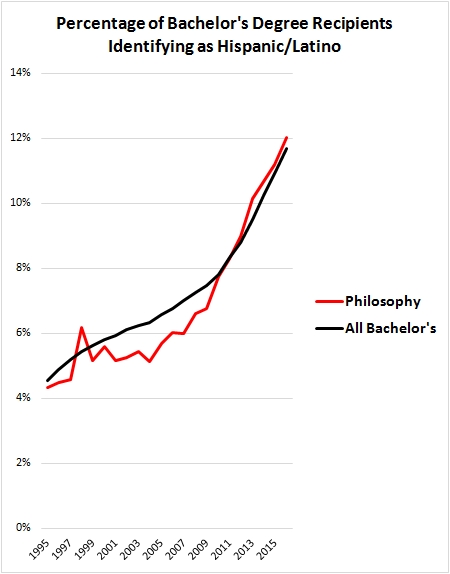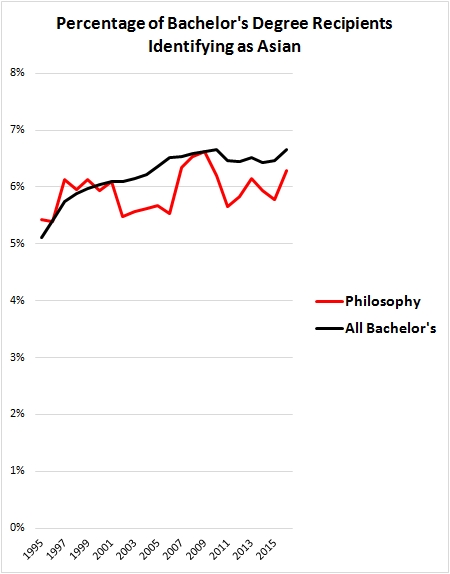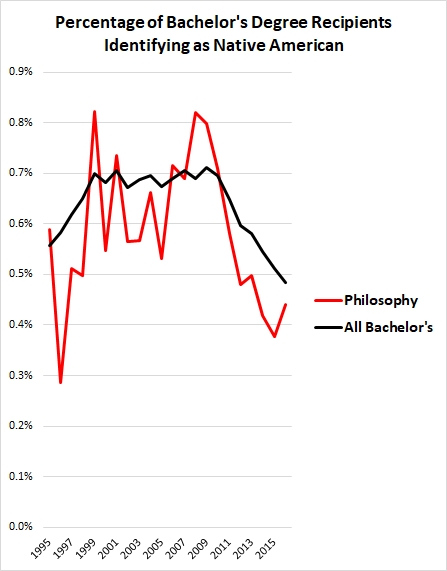The Racial Diversity of Philosophy Majors (guest post by Eric Schwitzgebel)
The following is a guest post* by Eric Schwitzgebel, professor of philosophy at University of California, Riverside. It first appeared at his blog, The Splintered Mind.
Philosophy Undergraduate Majors Aren’t Very Black, but Neither Are They As White As You Might Have Thought
by Eric Schwitzgebel
Okay, I have some more data from the NCES database on Bachelor’s degrees awarded in the U.S. A couple of weeks ago I noted that women have been earning 30-34% of philosophy BAs since the 1980s. Last week I noted the sharp decline in Philosophy, History, and English majors since 2010.
Race and ethnicity data are a bit more complicated, since the coding categories change over time. Currently, NCES uses “American Indian or Alaska Native”, “Asian”, “Black or African American”, “Hispanic or Latino”, “Native Hawaiian or Other Pacific Islander”, “White”, “Two or more races”, “Race/ethnicity unknown”, and “Nonresident alien”. The last three of these categories are difficult to interpret, especially given changes over time; and “Native Hawaiian or Other Pacific Islander” was included with Asian before 2010; so I will focus my analysis on the racial/ethnic categories Asian, Black, Latino/Hispanic, Native American, and White. (For more details, see the note.)
Based on results from my analysis last year on PhDs in Philosophy, I had expected Philosophy majors to be overwhelmingly White. To my surprise, that’s not what I found. Although recipients of Bachelor’s degrees in Philosophy are somewhat more White than recipients of Bachelor’s degrees overall, the difference is not large: 63% of BA recipients in Philosophy identified as White, compared to 60% of all graduating majors in the 2015-2016 academic year.
In the NCES data, both Latino/Hispanic students and Asian students are approximately proportionately represented among Philosophy majors: 13% and 7% respectively, compared to 12% and 7% of graduating students overall. Of course Latino students are underrepresented among college graduates generally, compared to their prevalence in the U.S. as a whole (about 18% of the U.S. population overall). However, they don’t appear to be more underrepresented among Philosophy majors than they are among Bachelor’s degree recipients in general.
Similarly—though the numbers are very small—Native Americans are about 0.4% of Philosophy degree recipients and about 0.5% of graduating students overall (and 1.3% in the general population).
In contrast, Black students are substantially underrepresented: 5% in Philosophy compared to 10% overall (and 13% in the general population).
Interestingly, these trends also appear to hold over time, back to the beginning of available data in the 1994-1995 academic year. White students are overrepresented in Philosophy by a few percentage points, Black students underrepresented by about as many percentage points, and the other groups are about proportionately represented. These trends persist throughout the broad decline in percentage of White students among Bachelor’s recipients overall.
Here’s the graph for White students:
And here’s Latino/Hispanic and Asian:
Native American is noisier due to small numbers, but roughly matches over the period:
The most striking disparity is among students identifying as Black:
Looking at intersection with gender, 42% of Black Philosophy BA recipients in the most recent two years of data were women. (For comparison, 33% of Philosophy BAs overall were women, 57% of Bachelor’s degree recipients overall were women, and 64% of Black Bachelor’s recipients were women.)
Evidently, the disproportionate Whiteness of Philosophy PhD recipients in the U.S. (recently in the mid-80%s, excluding nonresident alien and unknown) is not mostly explained by a similarly large disproportion among B.A. recipients, though the underrepresentation of Black students in the discipline does start at the undergraduate level.
I’d be interested to hear what others make of these patterns.
*******
Note 1: I looked at all U.S. institutions in the IPEDS database, and I included both first and second majors in Philosophy. Before the 2000-2001 academic year, only first major is recorded. I used the major classification 38.01 specifically for Philosophy, excluding 38.00, 38.02, and 38.99. Only people who completed the degree are included in the data. Before the 2007-2008 academic year, the White and Black categories specify “non-Hispanic”, and before 2010-2011, Pacific Islander is included with Asian. In the 2007-2008, “two or more races” is introduced as an option.







Although I do find this information somewhat interesting, it is unclear to me what we are supposed to with it. Is the goal to have an equal representation of each race, proportional to their rate of BA degrees? If so, why? And if this is the goal, it seems we have basically achieved it with the notable exception of black students. Does this mean there should be some effort to recruit black students? If so, why? And what on earth would such recruitment look like? I worry that any such efforts would be based on questionable stereotypes. On the other hand, does this data mean we should think there is some racial bias going on? It seems to me that is a big leap, and would require more evidence.
Equal representation should be the goal because in a large enough sample (as it is), persistently disproportionate numbers based on race indicate that there is something more than random individual preference determining the trend. This means either some races are more philosophically inclined than others (which is absurd), or there is something about how philosophy programs are set up and presented to students that does more to encourage white students to major than black students–and that is institutional racism. Since black people in the U.S. have a smaller proportionate share of the national income than whites, black students might have a stronger motivation to major in something perceived as less financially risky. That does not mean philosophy departments can wash their hands of this problem however, because it still skews BAs white, which in turns skews grad students white, and professors white: it just means that philosophy programs on their own would not be equipped to address this problem. But if the survey controlled for income, then the problem would be graver, and philosophy programs would be both more culpable and more in a position to fix the problem. In response to the question of what recruitment would look like, that would require more study of what turns black students off of philosophy at a higher rate, but as a start having more black faculty in philosophy, and offering classes that address questions that move black students in particular (which in say, a political philosophy class, might be slightly different than questions that move white students) seem to be the obvious paths forward.
Seems to me that it’s pretty straightforwardly fallacious to infer racism from such statistical disparities.
I think you might be working with an individualist concept of racism whereas Nicholas is working with an institutionalist one (they say so explicitly). It’s pretty straightforward to infer the latter from significant statistical disparities.
(To infer institutional racism from statistical disparities, not the concept of institutional racism)
I’m afraid it is still fallacious, at least in the absence of facts beyond that of the statistical disparity itself. There are all sorts of statistical disparities that we don’t attribute to institutional bias.
How are you understanding “institutional bias”, because I’m not sure it lines up with what Nicholas is talking about when they talk about “institutional racism”. I take them to mean by “institutional racism” something like “the way institutions are set up causes a racial disparity” – they aren’t arguing that there is necessarily bias on anyone’s part (they explicitly mention as a possibility that it might be explained by income/wealth disparity, which would be a non-bias explanation).
I can’t be much clearer than I already have. There are any number of cases where we do not ascribe institutional bias on the basis of a statistical disparity alone.
MA student is making an abductive inference I think. And I guess it’s pretty good. Idk. Test it with the surprise principle I guess.
The reason why even institutional racism is questionable here is that racism seems to only apply if that which the institutions are excluding the minority from is especially valuable. For example, if we found out to day that blacks were underrepresented in the homeless population, this would not suggest institutional racism. So while being a philosophy major is a good thing to some people, I think it is a bit presumptuous to assume it is a good thing overall, especially when we consider majoring in one thing precludes majoring in another. Would it be objectively good for black students (or other students) to major in philosophy rather than whatever else they are choosing to major in?
The reason some groups might not be choosing to major in philosophy might not have anything to do with being more or less “philosophically inclined”, but rather practical reasons , cultural reasons, or simply random circumstantial reasons.
I’m Latino and kinda surprised that demographic is so well represented among phil majors, but that’s a good thing I guess. I’m curious what proportion of majors were Mexican vs Cuban etc. but I doubt that info was recorded? Also, is there going to be a breakdown of majors by class? I’m from a working class background and I’d be interested. Personally, my economic background has been a more important factor in my life than my ethnic background (what I’m interested in, what opportunities are open to me, my attitudes, etc). This isn’t to deny that the two things are related of course. Also, it’d be interesting to see something about people with mental and/or physical disabilities (I fall into the former group and I suspect that so did many other majors).
Yeah, no info on that! I would love data on financial background, but NCES doesn’t have the ability to break that down by major.
Closest I have (for PhD) is here:
http://schwitzsplinters.blogspot.com/2017/10/do-philosophy-professors-tend-to-come.html
Yeah, I wonder whether any data would be available regarding class, which strikes me as more interesting than race. So like the black kid from NYC whose parents are physicians versus the white kid from Appalachia whose single mom makes meth. The extent to which philosophy is a rich kid’s game (or not) is something I haven’t seen discussed. Ofc, if it has and I’ve missed it, links appreciated. (And obviously class and race intersect, but it’s where they come apart that’d be good to look at.)
A dichotomy between the doubtful or unknown relevance of race and the importance of class can always be counted on to show up. Concrete reality somehow goes missing.
http://dailynous.com/2014/08/28/blacks-in-philosophy-in-the-us/
“Blacks make up just 1.32 percent of the total number of people professionally affiliated (as grad students or faculty) with U.S. philosophy departments.”
Is there any number below which the profession’s complacent wing might react with alarm and embarrassment? Presumably, anyone who cares about the near absence of blacks in philosophy would support aggressive efforts to attract and retain them — whatever their class background, gender, sexual orientation, etc.
Is this a reply to me or Jon or both? Because, among other things, I have over 70 students whose grades are due soon, which means I gotta prioritize my time, and I’d only want to engage with you substantially if your comment was directed at me. If it’s directed at Jon alone, I’d be glad to bow out. But I’d observe that Jon’s comment is pretty clearly replying to my own, so it isn’t showing up outta nowhere as if to derail a discussion of racial diversity in philosophy majors (much less in phil profs or phil grads)..
“Presumably, anyone who cares about the near absence of blacks in philosophy would support aggressive efforts to attract and retain them — whatever their class background, gender, sexual orientation, etc.”
Controlling for class can give a better idea of what efforts might be effective. If a large part of the disparity can be explained by disparities in income and wealth that’s going to call for very different interventions than if the explanation is largely bias, for example.
I am still dumbfounded as to how one’s complexion of skin or forefathers native homeland would correlate with the study of “Philosophy” or clear thinking.
Eric, thank you for these posts!
I’m struck by the fact that while there’s a persistent gap between percentage of Bachelor’s who are Black and percentage of Philosophy majors who are Black, the trend lines are pretty much the same. So if I understand the data correctly, Philosophy isn’t doing any worse than average at increasing our percentage of majors who are Black, and the current disparity is explained by the fact that we *started* low. Is this accurate?
Realized I was thinking about this wrong. What the fact that the trend lines are the same plausibly suggests is that the increase in % philosophy majors who are Black is explained by the increase in % Bachelor degree recipients who are Black overall, and that Philosophy is doing no better at attracting Black students from the pool of people in college than it did in the 90s.
I.e. a Black college student is about as likely to major in philosophy in 2015 as they where in 1995, but a greater percentage of college students are Black.
Thanks for your kind words and question, MA. I interpret the data as suggesting that Black students are underrepresented among Bachelor’s recipients across all disciplines and even more underrepresented among Philosophy BA recipients. NSF data (and a tentative peek at NCES data) suggest than they are still *more* underrepresented among Philosophy PhD recipients (ballpark 2%) and data from Liam Kofi Bright suggest that < 1% of authors in philosophy journals regarded as elite are Black. The cause(s) of this “leaky pipeline” is of course an interesting question!
Thank you! I realized I was probably thinking about the data wrong – see above.
Also, the leaky pipeline strikes me as at least as troubling as a disparity at the undergraduate level.
Of course, discrimination is wrong and should be rooted out and dealt with. But insofar this is a difference of interest, here’s a controversial, tentative thought: would it be good for us to make positive efforts to increase diversity in a field whose graduates notoriously make less on average than those in other fields, such as finance? I just wonder, if one central goal point here is economic empowerment of marginalized groups, if this is a laudable goal.
I’ve had a similar thought before. Along with comments above that philosophy is a “rich person’s game”, I suspect economics plays a substantial role here. I wouldn’t be in a Philosophy PhD program if I didn’t know that I have options, should my attempt to secure a TT job fail. If I had student loans or anything like that, I absolutely would not be studying philosophy: I’d study something with a stronger ROI. No doubt a lack of interesting questions/subject matter is at least sometimes a problem in philosophy, but I (a white male) can’t possibly be unusual as a philosophy PhD student who is only here because I economically can be.
The implication, it seems to me, is that if philosophy departments actually want to increase proportional recruitment across class (and therefore racial) lines, then they need to stop making so damn many philosophy PhDs. There’s a huge glut of supply here. Improve the ROI by shrinking the labor pool, and I suspect you’ll get more people from lower-income backgrounds.
Thanks for the work collecting this data, Eric. I guess I’ll be frank; my heart sank just a little reading some of the comments above. Thinking about my own past, I remember becoming excited about Philosophy and falling in love with it, not just as some abstract field of inquiry but for the society of really interesting and smart people that it introduced me to, who were compelled by the same kinds of questions that grabbed me and wouldn’t let go. In lots of ways that passion transcended the ethnic, racial, and economic backgrounds of the people I met in the field. On the other hand, it was a society I felt part of because of a common interest and when, every once in a while, it included someone who entered it with a different personal background and set of life experiences, that was kind of exciting, not necessarily because it radically changed my assumptions and questions — although that did happen sometimes — but because it made me appreciate even more how compelling a philosophical outlook was across differences in experience and the sometimes resulting differences in philosophical approach to questions. I’m interested in promoting inclusiveness in the society of people who get to make a living doing philosophy. Inclusiveness means something to me because, as consistently as I have been considered a foreigner (“You have no accent at all!” “You seem so Americanized.” etc) in my own country, I know how emotionally crushing it was to be excluded, not just when people subtly noted my own difference from the group but when I didn’t see but a few people in esteemed and respected positions in the field who were like me. Philosophy is as much, or more, a fellowship of people with faces and names as it is a competition among faceless, nameless submission authors and referees. If the statistics show that we could be better at recruiting students who are interested enough to be Philosophy majors and have backgrounds that are underrepresented in the society of professional Philosophers, let’s aspire to it.